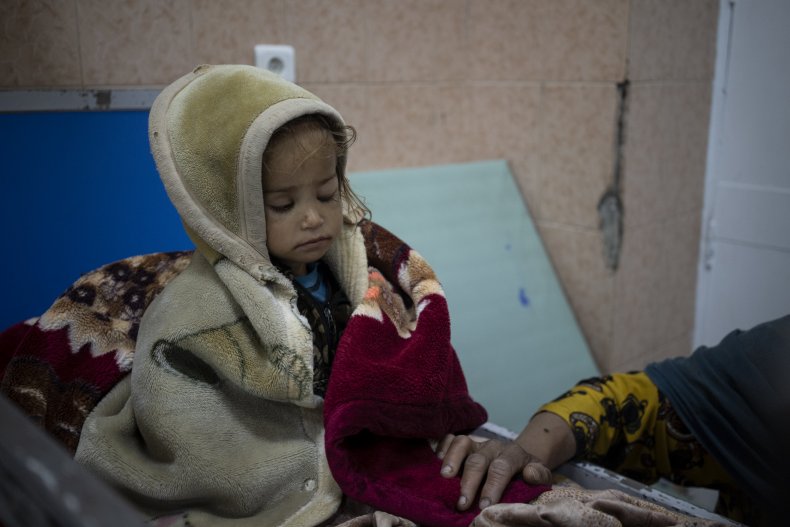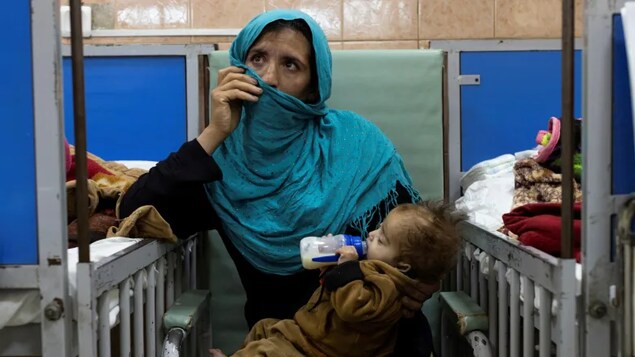Despair for Afghanistan
"I would not envision us [the World Bank] operating inside [Afghanistan] given the full breakdown [of the economy].""One of the challenges is the payment system. There's not the ability to have money actually flow, given what the current government is doing."David Malpass, head, The World Bank
Children are going to die. People are going to starve. Things are going to get a lot worse.I don't know how you don't have millions of people, and especially children, dying at the rate we are going with the lack of funding and the collapsing of the economy.World Food Programme (WFP) executive director David Beasley
 |
Reports out of Afghanistan describe wards in hospitals overwhelmed with the presence of malnourished babies. Children in weakened, vulnerable health condition dying after sharing scarce beds, and deadly infections blooming among them. Footage from one Kabul hospital showed children with bloated bellies, wasted limbs, crowded into cots, whose parents are too impoverished to adequately feed them, surrendering them to hospitals where they die.
The impoverished country had long relied on international philanthropy to sustain its 39 million population. Now that the government representing the Republic of Afghanistan is gone, corrupt as it was, the financial resources once open to the country have closed in response to the violent coup that gave rise once again to the Islamic Emirate of Afghanistan under Taliban rule. With the collapse of the country's economy has come the implosion of its health sector.
Afghan doctors have given warning of the dire effects visited upon the country's health system under the control of the illiterate administration of the Taliban. the country limping from severe to crisis under the Islamist fundamentalist rule. Washington-based World Bank's loans to the country had funded the transformation of Afghanistan's health care system in the past two decades of U.S.-NATO intervention, keeping the Taliban at bay and supporting a democratically elected government.
The situation in the country is deteriorating to a degree and with a swiftness that is head-spinning leading the head of the World Food Programme to warn the situation could become "hell on earth". Many Afghans desperately attempting to leave their country feel it already has become just that. But there is more, much worse to come according to these knowledgeable sources.
Allocations by the World Bank succeeded in funding over three-fifths of Afghanistan's 3,800 hospitals and clinics. Then came the abrupt loss of international funding hard on the heels of the Taliban takeover of the country, pitching the country, long aid-dependent, into a spiral of total dysfunction. Formerly, three-quarters of the Afghan government budget depended on foreign money under the presidency of Ashraf Ghani; where aid amounted to roughly two-fifths of economic output.
The indigent country's foreign reserves of $9 billion is now frozen to ensure the Taliban cannot profit from the cash infusion. On their part, the Taliban demand the national reserves be reopened to them along with aid resumption. They have few defenders, however. The international community appears dead set against not giving aid to the country, but to the Taliban.
When the government ouster took place in August's surprisingly swift turmoil-and-transition, the Taliban made every effort to exercise its voice diplomatically with an eye to future external relations, softening its image, assuring the foreign press that its tactics had undergone change, that it was prepared to govern more equably, inclusively, recognizing that the population is comprised of different ethnic and sectarian groups.
Under their new reign a different program would be rolled out for girls and women; equitable, in recognition that to prosper a country must have the full participation of half its population, that women would no longer be forbidden to show themselves in public, that girls could attend school, and women would be permitted to work outside the home. None of which has actually materialized under the critical eye of the world community.
Instead a vengeance hunt of former government figures, of former government workers, of military figures, of people who worked for foreign governments and their military arms, has been carried out diligently as feared. Rumours of Taliban 'justice' in the form of abductions and murders gravitate to the ears of foreign diplomats and from there to their governments, leaving them displeased at the disorder and misrepresentation, unwilling to fund human rights abuse.
That Talibs have been appointed to oversee the administration of hospitals with their lack of knowledge, education and expertise in any field exacerbates the crisis. Health staff speak of new administrators eager to enforce a separation of male and female hospital personnel, or focusing on the niceties of religious devotion, not the operation of a health care system.
 |
Farzana, 30, holds her one-year-old baby Omar at the malnutrition ward for infants at the Indira Gandhi hospital in Kabul, Afghanistan over the weekend. Massive inflows of funding are needed to stave off a major crisis over the winter, a humanitarian agency leader says. Photo: (Jorge Silva/Reuters) |
Labels: Afghanistan, Economy Faltering, Foreign Aid, Hospital Collapse, Taliban, World Bank

<< Home